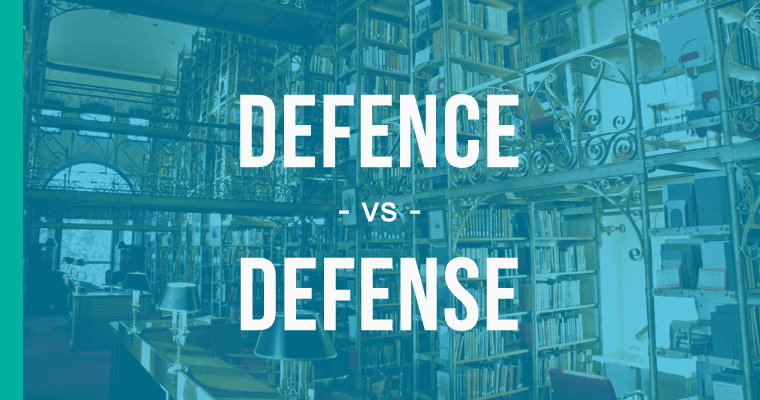Defense vs Defence: A Linguistic Battle Across Borders
Contents

Imagine you're a software professional from India who got an opportunity to work on a cybersecurity project. Your manager, based in the US, expects you to prepare a report on "defense strategies against cyber threats". Simultaneously, your UK-based client anticipates a presentation on "defence measures in the digital realm". You notice two versions of the same word - "defense" and "defence," causing confusion and possibly impacting your professional credibility.
Understanding the difference between "defense" and "defence" helps you avoid misunderstandings and ensures accurate communication in diverse settings.
In this blog post, we delve into the defense vs defence meanings and differences, explaining when and where each version is used. We'll also discuss practical tips to remember these differences. So, let’s embark on this linguistic journey together.
What's in a Spelling? Defense or Defence
Often, learners of English, especially those tuning into the defence vs defense UK and US English debate, struggle with the correct usage of such words.
While "defense" and "defence" may appear different, they essentially stem from the same Latin root 'defensus', meaning to protect or resist. Both spellings carry the same meaning - protection against harm or danger.
So, why two spellings? It traces back to divergence in English language usage across regions, specifically between British and American English.
Essentially, your choice of spelling will depend on who your audience is. For Indian professionals engaging predominantly with UK businesses or following British English norms, 'defence' would be more appropriate.
Remember, whether it’s ‘defense’ or ‘defence’, what matters most is understanding and using the word confidently in your conversations!
The Game Changer: American vs British English

The British retained the Old French spelling - 'defence'. It's commonly used in Commonwealth countries, including India.
On the other hand, Americans adopted a Latin influenced spelling - 'defense'. That's why you'll see this version more frequently in American literature and broadcasts.
Check out the table below for some words that differ in American and British English:
British English | American English |
Colour | Color |
Centre | Center |
Defence | Defense |
The disparities arose because Noah Webster, an American lexicographer, reformed spellings to create a unique identity for American English in the 1800s. This resulted in conundrums like "defence vs defense Canada", considering Canada leans towards British spelling conventions.
Decoding Contextual Usage – Defense or Defence?
As a professional, you may often find yourself needing to use either the word 'defence' or 'defense'. So, which one should you choose? Well, both are correct, but their usage is determined by context and regional preference.
Let's break down the defence vs defense meaning with some practical examples:
In a business meeting with American clients: "The new cybersecurity measures will considerably strengthen our company's defense against potential threats."
During a discussion with UK partners: "The proposed budget allocation for data protection will boost our defence capabilities."
Remember, in American English, 'defense' is preferred while in British English, 'defence' prevails. But what about when you're interacting with Canadian or Australian colleagues who also have their own English variations? They primarily use 'defence', similar to the British.
Understanding these regional preferences can greatly enhance global communication.
While this post focuses on the defence vs defense difference, there are countless other words with varied regional spellings and meanings that you may encounter in your professional journey.
Master ‘Defense’ and ‘Defence’: Practical Tips
To master the usage of 'defense' and 'defence', consistent practice is your best aid. Let's explore some practical tips.
Reading Materials: Start by reading UK-based publications, such as The Telegraph or The Guardian, where 'defence' is primarily used. Simultaneously, delve into US-centric reads such as The New York Times or Washington Post, which use 'defense'. Jot down sentences using these words for reference.
Writing Tactics: Practice writing sentences using both versions of the word depending on the context - 'defence vs defense UK', 'defence vs defense in India', etc. This will help consolidate your understanding.
Interactive Exercises: Participate in online quizzes and games specifically focusing on British and American English differences.
How Clapingo Can Help
Are you puzzled by 'defence vs defense' or 'canceled vs cancelled' or 'favourite vs favorite'? Clapingo's unique, one-on-one personalised coaching can fruitfully assist you with this and many such complicated aspects of English language learning. Our native English-speaking tutors understand the challenges faced by non-native speakers like you, particularly in India, where British English is prevalent.
Clapingo's easy-to-use platform comes with adaptable plans tailored for diverse needs. Whether you're looking to improve your professional communication or simply wish to hone your English skills, we have a plan that suits you.
The Bottomline
After a thorough exploration of the usage of 'defense' and 'defence', we've concluded that the key difference lies in the regional usage. Remember, "defense vs defence meaning" primarily ranges by geography and context. While both spellings are correct, your choice will depend on whether you're using British or American English.
Nevertheless, irrespective of spelling differences, the essence remains similar – they both refer to protection against harm or danger.
If you still find yourself at odds with these subtle differences in English usage, don't worry! Clapingo offers structured courses helmed by native English speakers who can guide you through these complexities. Our personalised coaching sessions strike the right balance between theoretical knowledge and practical usage.
Remember, mastering English can be easy when guided correctly; let Clapingo lead the way!
Frequently Asked Questions
1. What is the difference between defence and defense?
The difference between "defence" and "defense" lies in their regional usage. Both words have the same meaning, referring to protection from harm or danger. "Defence" is used in British English, prevalent in India and UK, while "Defense" is used in American English, common in the US, Canada, and football terminology.
2. Is it wrong to use defense instead of defence in India?
In India, following British English spelling conventions, "defence" is the correct usage. However, using "defense" isn't necessarily wrong—it's just more common in American English. If you're writing for an American audience or about North American football, using "defense" would be more appropriate.
3. Which spelling is used in legal contexts: defence or defense?
Both spellings are used in legal contexts depending on the region. In countries that follow British English like India and UK, "defence" is used. In contrast, American law uses "defense". Regardless of the variant you choose, ensure consistency throughout your document.
You may want to read
Exploring India's Challenges and Efforts with English Language Mastery
Comments
Your comment has been submitted